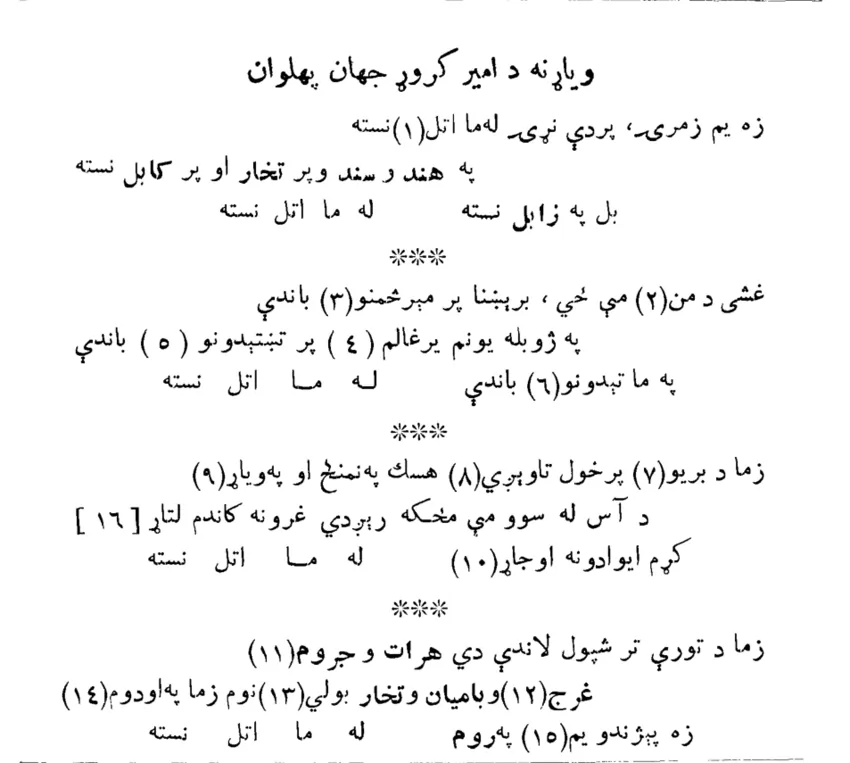In 1950s Abdul Hai Habibi ‘discovered’ a rare document in Pakistan from Ghaznavid or Ghorid period on the basis of which he claimed that the Lawiks of Ghazni and the Turk Shahi rulers of Kabul in 8th century were Pashto-speakers !
In 1957, while he was in exile in Pakistan, he ‘discovered’ a small Persian manuscript ‘by chance’, when he met a Baloch of Dera Ismail Khan in Karachi who was carrying it. The latter was a mureed of Sakhi Sarwar (a 12th century saint buried in Dera Ghazi Khan) and the book contained tales about Sakhi Sarwar. Abdul Hai Habibi examined it and concluded that the paper and calligraphy point to a date of 1500 AD for the copying of the manuscript ; the literary style points to the Ghaznavid or Ghorid period for the date of composition.
Unfortunately (or conveniently), Habibi lost track of the original manuscript and his own transcripts and photographs were unfortunately (or conveniently) confiscated by Pakistani police. Luckily (or conveniently) Habibi managed to retain the record of that page which had the sample of very early Pashto spoken by Kabul Shah in 10th century. Habibi published it, with his own corrections to the original, in his monograph entitled “Pashto wa Loyikan-i-Ghazni” in 1962. According to it, the Kabul Shah sent a line of poetry to the Lawik ruler of Ghazni in “Lisan-i-Khaljia” (the language of Khaljis) which the Lawik had spoken. Habibi reads that line of poetry (supposedly) in the Khalji language as archaic Pashto. Following is the screenshot of that line of verse which Habibi interprets as very early Pashto:

The English translation of some of the text copied from that manuscript Habbi ‘discovered’, is as follows:
“In the history of Ghazni by Hasan-i- Saghani is a story from Abu Hamid az-Zawuli. According to this, there was a great mosque in the town of Ghazna, by the Bamiyan, gate, which was known as the mosque of Aflah Lawik. This had been a great idol-temple (but-khana), which Wujwir Lawik had erected in the honour of the Ratbil and the Kabul Shah.
When his (Wujwir Lawik’s) son Khanan was converted to Islam, he was nevertheless disinclined to destroy the idol of Lawik , so he buried it beneath the ground in the temple, placing it in a silver casket. The Kabul-Shah sent the following line of poetry, in the Khalji language, which the Lawik had spoken.
[Here follows a line of verse, in archaic Pashto according to Habibi, with following meaning]
‘Alas ! the idol of Lawik had been interred beneath the earth of Ghazna, and the Lawiyan family have given away (the embodiment of) their kingly power. ‘
[Translation by Clifford Edmund Bosworth]
Interestingly Amir Kror Suri, a contemporary of the above-mentioned Lawik ruler of Ghazni, also spoke Pashto according to Pata Khazana (also ‘discovered’ by Abdul Hai Habibi). Pata Khazana was compiled in 1728 AD and contains samples of Pashto poetry from 8th century AD to the time of the compiler. The archaic Pashto of Amir Kror Suri is very easy to understand but the archaic Pashto of his contemporary Turk-Shahi ruler of Kabul would be more or less gibberish for a modern Pashtun. George Morgenstierne found the ‘Viarna’ of Amir Kror to be “suspiciously modern”. Compare the above line of verse in ‘lisan-i-Khaljiya’ with the following sample of archaic Pashto of Amir Kror Suri as recorded in Pata Khazana:

